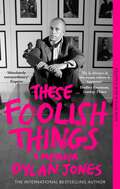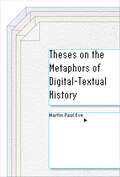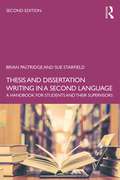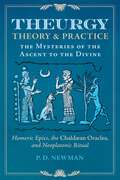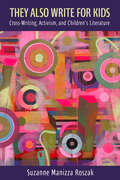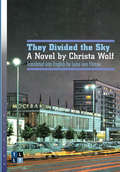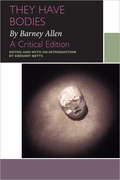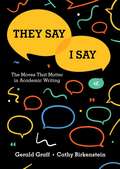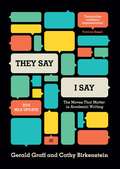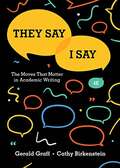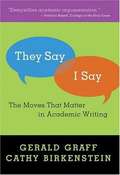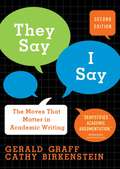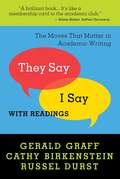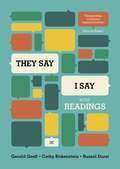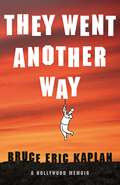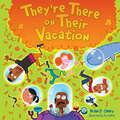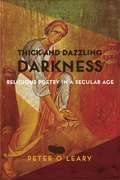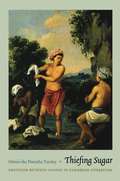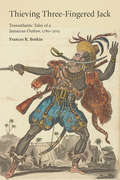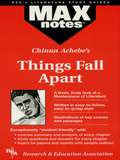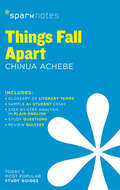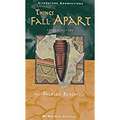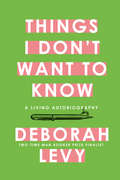- Table View
- List View
These Foolish Things: A Memoir
by Dylan JonesFew people can say they have shaped the cultural landscape of the last four decades while crossing paths with some of the most extraordinary personalities on the planet. But then, of course, Dylan Jones isn't just anyone.These Foolish Things captivatingly charts Dylan's life: from his peripatetic childhood and late adolescence in 1970s London - a city then alive with possibility - to his award-winning tenure at what would become one of the most dynamic magazines of its era, GQ. It details how he came to be in that hot seat: a journey through the Swinging London slipstreams of punk and new romanticism, and through i-D, The Face and Arena, which created the platform on which GQ was based, with Dylan as a common denominator.Littered with a gold-star cast of characters - including a who's who of celebrity from David Bowie and Bryan Ferry to Alastair Campbell and Prince Charles, via Samuel L. Jackson, Piers Morgan and Rihanna - this memoir reflects on how GQ became an established style and how Dylan sought to stir up music, politics and fashion.Witty, perceptive and deliciously entertaining, but by turns bravely vulnerable, These Foolish Things is a memoir like no other: a dazzling retelling of the start of the twenty-first century from one of the world's most fascinating media giants.
Theses on the Metaphors of Digital-Textual History (Stanford Text Technologies)
by Martin Paul EveDigital spaces are saturated with metaphor: we have pages, sites, mice, and windows. Yet, in the world of digital textuality, these metaphors no longer function as we might expect. Martin Paul Eve calls attention to the digital-textual metaphors that condition our experience of digital space, and traces their history as they interact with physical cultures. Eve posits that digital-textual metaphors move through three life phases. Initially they are descriptive. Then they encounter a moment of fracture or rupture. Finally, they go on to have a prescriptive life of their own that conditions future possibilities for our text environments—even when the metaphors have become untethered from their original intent. Why is "whitespace" white? Was the digital page always a foregone conclusion? Over a series of theses, Eve addresses these and other questions in order to understand the moments when digital-textual metaphors break and to show us how it is that our textual softwares become locked into paradigms that no longer make sense. Contributing to book history, literary studies, new media studies, and material textual studies, Theses on the Metaphors of Digital-Textual History provides generative insights into the metaphors that define our digital worlds.
Thesis and Dissertation Writing in a Second Language: A Handbook for Students and their Supervisors
by Brian Paltridge Sue StarfieldFully updated and packed with new material, the second edition of Thesis and Dissertation Writing in a Second Language is the ideal guide for non-native speaker students and their supervisors working on writing a thesis or dissertation in English. Considering the purposes of thesis and dissertation of writing alongside writer/reader relationships, this book uses accessible language and practical examples to discuss issues that are crucial to successful thesis and dissertation writing. This edition offers: Insights into the experience of being a doctoral writer, issues of writer identity and writing with authority Typical language and discourse features of theses and dissertations Advice on the structure and organisation of key sections Suggestions for online resources which support writing Extracts from completed theses and dissertations Guidance on understanding examiner expectations Advice on publishing from a PhD Suitable for students from all disciplines, Thesis and Dissertation Writing in a Second Language is essential reading for non-native speaker students looking to complete a thesis or dissertation in English.
Theurgy: The Mysteries of the Ascent to the Divine
by P. D. NewmanConnects the magical practice of theurgy to the time of Homer• Explores the many theurgic themes and events in the Odyssey and the Iliad• Analyzes the writings of Neoplatonists Porphyry and Proclus, showing how both describe the technical ritual praxis of theurgy in Homeric terms• Examines the methods of telestikē, a form of theurgic statue animation and technique to divinize the soul, and how theurgy is akin to shamanic soul flightFirst defined by the second century Chaldean Oracles, theurgy is an ancient magic practice whereby practitioners divinized the soul and achieved mystical union with a deity, the Demiurge, or the One.In this detailed study, P. D. Newman pushes the roots of theurgy all the way back before the time of Homer. He shows how the Chaldean Oracles were not only written in Homeric Greek but also in dactylic hexameter, the same meter as the epics of Homer. Linking the Greek shamanic practices of the late Archaic period with the theurgic rites of late antiquity, the author explains how both anabasis, soul ascent, and katabasis, soul descent, can be considered varieties of shamanic soul flight and how these practices existed in ancient Greek culture prior to the influx of shamanic influence from Thrace and the Hyperborean North.The author explores the many theurgic themes and symbolic events in the Odyssey and the Iliad, including the famous journey of Odysseus to Hades and the incident of the funeral pyre of Patroclus. He presents a close analysis of On the Cave of the Nymphs, Porphyry&’s commentary on Homer&’s Odyssey, as well as a detailed look at Proclus&’s symbolic reading of Homer&’s Iliad, showing how both of these Neoplatonists describe the philosophical theory and the technical ritual praxis of theurgy. Using the Chaldean Oracles as a case study, Newman examines in detail the methods of telestikē, a form of theurgic statue animation, linking this practice to ancient Egyptian and Greek traditions as well as theurgic techniques to divinize the soul.Revealing how the theurgic arts are far older than the second century, Newman&’s study not only examines the philosophical theory of theurgy but also the actual ritual practices of the theurgists, as described in their own words.
They Also Write for Kids: Cross-Writing, Activism, and Children's Literature (Cultures of Childhood)
by Suzanne Manizza RoszakOutside the world of children’s literature studies, children’s books by authors of well-known texts “for adults” are often forgotten or marginalized. Although many adults today read contemporary children’s and young adult fiction for pleasure, others continue to see such texts as unsuitable for older audiences, and they are unlikely to cross-read children’s books that were themselves cross-written by authors like Chinua Achebe, Anita Desai, Joy Harjo, or Amy Tan. Meanwhile, these literary voices have produced politically vital works of children’s literature whose complex themes persist across boundaries of expected audience. These works form part of a larger body of activist writing “for children” that has long challenged preconceived notions about the seriousness of such books and ideas about who, in fact, should read them. They Also Write for Kids: Cross-Writing, Activism, and Children’s Literature seeks to draw these cross-writing projects together and bring them to the attention of readers. In doing so, this book invites readers to place children’s literature in conversation with works more typically understood as being for adult audiences, read multiethnic US literature alongside texts by global writers, consider children’s poetry and nonfiction as well as fiction, and read diachronically as well as cross-culturally. These ways of reading offer points of entry into a world of books that refuse to exclude young audiences in scrutinizing topics that range from US settler colonialism and linguistic prejudice to intersectional forms of gender inequality. The authors included here also employ an intricate array of writing strategies that challenge lingering stereotypes of children’s literature as artistically as well as intellectually simplistic. They subversively repurpose tropes and conventions from canonical children’s books; embrace an epistemology of children’s literature that emphasizes ambiguity and complexity; invite readers to participate in redefining concepts such as “civilization” and cultural belonging; engage in intricate acts of cross-cultural representation; and re-envision their own earlier works in new forms tailored explicitly to younger audiences. Too often disregarded by skeptical adults, these texts offer rich rewards to readers of all ages, and here they are brought to the fore.
They Divided the Sky: A Novel by Christa Wolf (Literary Translation)
by Christa WolfFirst published in 1963, in East Germany, They Divided the Sky tells the story of a young couple, living in the new, socialist, East Germany, whose relationship is tested to the extreme not only because of the political positions they gradually develop but, very concretely, by the Berlin Wall, which went up on August 13, 1961. The story is set in 1960 and 1961, a moment of high political cold war tension between the East Bloc and the West, a time when many thousands of people were leaving the young German Democratic Republic (the GDR) every day in order to seek better lives in West Germany, or escape the political ideology of the new country that promoted the "farmer and peasant" state over a state run by intellectuals or capitalists. The construction of the Wall put an end to this hemorrhaging of human capital, but separated families, friends, and lovers, for thirty years. The conflicts of the time permeate the relations between characters in the book at every level, and strongly affect the relationships that Rita, the protagonist, has not only with colleagues at work and at the teacher's college she attends, but also with her partner Manfred (an intellectual and academic) and his family. They also lead to an accident/attempted suicide that send her to hospital in a coma, and that provide the backdrop for the flashbacks that make up the narrative. Wolf's first full-length novel, published when she was thirty-five years old, was both a great literary success and a political scandal. Accused of having a 'decadent' attitude with regard to the new socialist Germany and deliberately misrepresenting the workers who are the foundation of this new state, Wolf survived a wave of political and other attacks after its publication. She went on to create a screenplay from the novel and participate in making the film version. More importantly, she went on to become the best-known East German writer of her generation, a writer who established an international reputation and never stopped working toward improving the socialist reality of the GDR.
They Have Bodies, by Barney Allen: A Critical Edition (Canadian Literature Collection)
by Barney AllenPublished in 1929, and almost instantly censored by the Toronto City Police, They Have Bodies has been completely overlooked by generations of scholars and writers interested in the Canadian avant-garde. It is not just the novel’s extreme formal innovation that is immediately startling about They Have Bodies. There is also its close attention to the depraved, licentious behaviour of Toronto’s elite, its revelation of moral hypocrisy, and its exposure of the means by which aristocratic and church power provides succour to egregious duplicity. Its social criticism and dark humour were too much for Canadian readers at the time. It is, however, exactly the kind of book contemporary Canadian readers, writers, and scholars hope lies buried in the archives waiting to be recovered. A gem of insight, innovation, and novelty: finally, here is a new edition of one of the rarest, wildest books of the twentieth century. This book is published in English - Publié en 1929 et presque instantanément censuré par les services de police de la ville de Toronto, cet ouvrage, intitulé They Have Bodies, a été complétement négligé par des générations d’écrivains et de chercheurs, par ailleurs habituellement sensibles aux créations de l’avant-garde canadienne. En fait, ce n’est pas seulement l’extrême innovation formelle de ce roman qui surprend et saisit de prime abord, mais aussi l’attention particulière que l’auteur prête au comportement dépravé et licencieux de l’élite torontoise. Dans cet ouvrage, Barney Allen révèle l’hypocrisie morale de cette élite aristocratique et religieuse ainsi que les moyens auxquels elle recourt pour masquer sa monstrueuse duplicité. Cette violente critique sociale, alliée à un humour noir des plus décapants, était sans doute trop corrosive pour les lecteurs canadiens de cette époque. Cependant, ce roman correspond exactement au type d’ouvrages, profondément enfouis dans les archives, que des lecteurs, des écrivains et des chercheurs canadiens contemporains espèrent ardemment exhumer et redécouvrir. En fait, ce texte avant-gardiste constitue un véritable joyau de perspicacité, d’innovation et de hardiesse. Cette nouvelle édition vous permettra de découvrir un des romans les plus singuliers et les plus audacieux du XXe siècle. Ce livre est publié en anglais.
They Need Nothing
by Robert Richmond EllisThe first comprehensive study of Spanish writings on East and Southeast Asia from the Spanish colonial period, They Need Nothing draws attention to many essential but understudied Spanish-language texts from this era. Robert Richmond Ellis provides an engaging, interdisciplinary examination of how these writings depict Asia and Asians as both similar to and different from Europe and Europeans, and details how East and Southeast Asians reacted to the Spanish presence in Asia.They Need Nothing highlights texts related to Japan, China, Cambodia, and the Philippines, beginning with Francis Xavier's observations of Japan in the mid-sixteenth century and ending with José Rizal's responses to the legacy of Spanish colonialism in the late nineteenth century. Ellis provides a groundbreaking expansion of the geographical and cultural contours of Hispanism that bridges the fields of European, Latin American, and Asian Studies.
They Say / I Say: The Moves That Matter In Academic Writing (Fourth Edition)
by Gerald Graff Cathy BirkensteinThis book identifies the key rhetorical moves in academic writing. It shows students how to frame their arguments as a response to what others have said and provides templates to help them start making the moves. The fourth edition features many NEW examples from academic writing, a NEW chapter on Entering Online Discussions, and a thoroughly updated chapter on Writing in the Social Sciences. Finally, two NEW readings provide current examples of the rhetorical moves in action.
They Say / I Say: The Moves That Matter In Academic Writing 3rd Edition
by Gerald Graff Cathy Birkenstein"They Say / I Say" identifies the key rhetorical moves in academic writing, showing students how to frame their arguments in the larger context of what others have said and providing templates to help them make those moves. And, because these moves are central across all disciplines, the book includes chapters on writing in the sciences, writing in the social sciences, and--new to this edition--writing about literature.
They Say / I Say: The Moves That Matter In Academic Writing With Readings
by Russel Durst Gerald Graff Cathy BirkensteinThis book identifies the key rhetorical moves in academic writing. It shows students how to frame their arguments as a response to what others have said and provides templates to help them start making the moves. The fourth edition features many NEW examples from academic writing, a NEW chapter on Entering Online Discussions, and a thoroughly updated chapter on Writing in the Social Sciences. Finally, two NEW readings provide current examples of the rhetorical moves in action.
They Say / I Say: The Moves That Matter in Academic Writing
by Gerald Graff Cathy Birkenstein"They Say / I Say" shows that writing well means mastering some key rhetorical moves, the most important of which involves summarizing what others have said ("they say") to set up one's own argument ("I say"). In addition to explaining the basic moves, this book provides writing templates that show students explicitly how to make these moves in their own writing.
They Say / I Say: The Moves That Matter in Academic Writing (2nd edition)
by Gerald Graff Cathy BirkensteinThey Say / I Say has essentially defined academic writing, identifying its key rhetorical moves, the most important of which is to summarize what others have said to set up one's own argument.
They Say / I Say: The Moves That Matter in Academic Writing, with Readings
by Russel Durst Gerald Graff Cathy BirkensteinIn addition to explaining the basic moves, this book provides writing templates that show students explicitly how to make these moves in their own writing. Now available in two versions, with and without an anthology of 32 readings.
They Say, I Say: The Moves That Matter in Academic Writing with Readings
by Russel Durst Gerald Graff Cathy Birkenstein"They Say / I Say" with Readings shows that writing well means mastering some key rhetorical moves, the most important of which is to summarize what others have said ("they say") in order to set up one's own argument ("I say"). Templates help students make these moves in their own writing, and 50 readings demonstrate the moves and prompt students to think-and write.
They Went Another Way: A Hollywood Memoir
by Bruce Eric KaplanA darkly comic memoir about being a working creative person in a world that is growing ever more dysfunctional, by acclaimed New Yorker cartoonist and television writer Bruce Eric Kaplan.In January 2022, Bruce Eric Kaplan found himself confused and upset by the state of the world and the state of his life as a television writer in Los Angeles. He started a journal to keep from going mad, which eventually became They Went Another Way.The book’s through line traces his attempt to get a television project set up in the increasingly Byzantine world of Hollywood. But as he details the project’s ups and downs, Kaplan finds himself ruminating not only on show business but also on today’s political and social issues, on old movies and TV shows and music, on his family, on his friends, on his past, on his failing heating system, and on all the dead birds that keep showing up in his backyard.This hilarious and surprisingly moving book is about life—about art, about love, about alienation, about connection, about ugliness and beauty, about disappointment, wonder, and hope. In short, it is about everything.
They're There on Their Vacation
by Jim Paillot Brian P ClearyMeet the Tuckabees. They're going on vacation. But not an ordinary vacation. They always choose the wackiest, weirdest destinations for their family trips. This year their stops include visits to the world's largest underwear, a narwhal petting zoo, and the amazing Cheezie Popz factory. No matter where this family goes, they're sure to have tons of fun when they get there. Come along for the ride—and along the way, learn to tell apart they're, their, and there. These words sound alike, but they're different in meaning. Figure out how to keep them straight as you join the Tuckabees on their adventures.
Thick and Dazzling Darkness: Religious Poetry in a Secular Age
by Peter O'LearyHow do poets use language to render the transcendent, often dizzyingly inexpressible nature of the divine? In an age of secularism, does spirituality have a place in modern American poetry? In Thick and Dazzling Darkness, Peter O’Leary reads a diverse set of writers to argue for the existence and importance of religious poetry in twentieth- and twenty-first-century American literature. He traces a poetic genealogy that begins with Whitman and Dickinson and continues in the work of contemporary writers to illuminate an often obscured but still central spiritual impulse that has shaped the production and imagination of American poetry.O’Leary presents close and comprehensive readings of the modernist, late-modernist, and postmodern poets Robinson Jeffers, Frank Samperi, and Robert Duncan, as well as the contemporary poets Joseph Donahue, Geoffrey Hill, Fanny Howe, Nathaniel Mackey, Pam Rehm, and Lissa Wolsak. Examining how these poets drew on a variety of traditions, including Catholicism, Gnosticism, the Kabbalah, and mysticism, the book considers how modern and contemporary poets have articulated the spiritual in their work. O’Leary also argues that an anxiety of misunderstanding exists in the study and writing of poetry between secular and religious impulses and that the religious nature of poets’ works is too often marginalized or misunderstood. Examining the works of a specific poet in each chapter, O’Leary reveals their complexity and offers a defense of the value and meaning of religious poetry against the grain of a secular society.
Thiefing Sugar: Eroticism between Women in Caribbean Literature
by Lisa Lowe Judith Halberstam Omise’eke Natasha TinsleyIn Thiefing Sugar, Omise'eke Natasha Tinsley explores the poetry and prose of Caribbean women writers, revealing in their imagery a rich tradition of erotic relations between women. She takes the book's title from Dionne Brand's novel In Another Place, Not Here, where eroticism between women is likened to the sweet and subversive act of cane cutters stealing sugar. The natural world is repeatedly reclaimed and reinterpreted to express love between women in the poetry and prose that Tinsley analyzes. She not only recuperates stories of Caribbean women loving women, stories that have been ignored or passed over by postcolonial and queer scholarship until now, she also shows how those erotic relations and their literary evocations form a poetics and politics of decolonization. Tinsley's interpretations of twentieth-century literature by Dutch-, English-, and French-speaking women from the Caribbean take into account colonialism, migration, labor history, violence, and revolutionary politics. Throughout Thiefing Sugar, Tinsley connects her readings to contemporary matters such as neoimperialism and international LGBT and human-rights discourses. She explains too how the texts that she examines intervene in black feminist, queer, and postcolonial studies, particularly when she highlights the cultural limitations of the metaphors that dominate queer theory in North America and Europe, including those of the closet and "coming out."
Thieving Three-Fingered Jack: Transatlantic Tales of a Jamaican Outlaw, 1780-2015
by Frances R. BotkinThe fugitive slave known as “Three-Fingered Jack” terrorized colonial Jamaica from 1780 until vanquished by Maroons, self-emancipated Afro-Jamaicans bound by treaty to police the island for runaways and rebels. A thief and a killer, Jack was also a freedom fighter who sabotaged the colonial machine until his grisly death at its behest. Narratives about his exploits shed light on the problems of black rebellion and solutions administered by the colonial state, creating an occasion to consider counter-narratives about its methods of divide and conquer. For more than two centuries, writers, performers, and storytellers in England, Jamaica, and the United States have “thieved" Three Fingered Jack's riveting tale, defining black agency through and against representations of his resistance.Frances R. Botkin offers a literary and cultural history that explores the persistence of stories about this black rebel, his contributions to constructions of black masculinity in the Atlantic world, and his legacies in Jamaican and United States popular culture.
Things Fall Apart (MAXNotes Literature Guides)
by Sara O'BrienREA's MAXnotes for Chinua Achebe's Things Fall Apart MAXnotes offer a fresh look at masterpieces of literature, presented in a lively and interesting fashion. Written by literary experts who currently teach the subject, MAXnotes will enhance your understanding and enjoyment of the work. MAXnotes are designed to stimulate independent thought about the literary work by raising various issues and thought-provoking ideas and questions. MAXnotes cover the essentials of what one should know about each work, including an overall summary, character lists, an explanation and discussion of the plot, the work's historical context, illustrations to convey the mood of the work, and a biography of the author. Each chapter is individually summarized and analyzed, and has study questions and answers.
Things Fall Apart SparkNotes Literature Guide (SparkNotes Literature Guide Series #61)
by SparkNotesThings Fall Apart SparkNotes Literature Guide by Chinua Achebe Making the reading experience fun! When a paper is due, and dreaded exams loom, here's the lit-crit help students need to succeed! SparkNotes Literature Guides make studying smarter, better, and faster. They provide chapter-by-chapter analysis; explanations of key themes, motifs, and symbols; a review quiz; and essay topics. Lively and accessible, SparkNotes is perfect for late-night studying and paper writing. Includes:An A+ Essay—an actual literary essay written about the Spark-ed book—to show students how a paper should be written.16 pages devoted to writing a literary essay including: a glossary of literary termsStep-by-step tutoring on how to write a literary essayA feature on how not to plagiarize
Things Fall Apart and Related Readings
by Chinua AchebeA book containing Things Fall Apart by Chinua Achebe and other great poems, stories and essays.
Things I Don't Want to Know: On Writing
by Deborah LevyA luminescent treatise on writing, love, and loss, a witty response to George Orwell's influential essay "Why I Write" Things I Don't Want to Know is the first in Deborah Levy's essential three-part "living autobiography" on writing and womanhood. Taking George Orwell's famous essay, "Why I Write", as a jumping-off point, Deborah Levy offers her own indispensable reflections of the writing life. With wit, clarity and calm brilliance, she considers how the writer must stake claim to that contested territory as a young woman and shape it to her need. Things I Don't Want to Know is a work of dazzling insight and deep psychological succour, from one of our most vital contemporary writers.
Things I Have to Tell You: Poems and Writing by Teenage Girls
by Betsy FrancoIn these poems and essays written by girls between the ages of 12 and 19, we share their experiences of living in a world plagued with violence, a drive to be thin, and an enduring hope that love will prevail.
